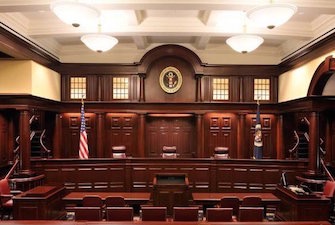 In re Brunetti, (Fed. Cir. Dec. 15, 2017) (Before Dyk, Moore, and Stoll, J.) (Opinion for the court, Moore, J.) (Concurring opinion, Dyk, J.) .
In re Brunetti, (Fed. Cir. Dec. 15, 2017) (Before Dyk, Moore, and Stoll, J.) (Opinion for the court, Moore, J.) (Concurring opinion, Dyk, J.) .
The Federal Circuit reversed a Patent Trial and Appeal Board (“Board”) decision affirming a refusal to register the mark “FUCT” because it comprised immoral or scandalous matter under 15 U.S.C. § 1052(a) (“Section 2(a)”). While the Board properly relied on substantial evidence to support its conclusion, the bar against registering immoral or scandalous marks was held to be an unconstitutional restriction on free speech.
Section 2(a) of the Lanham Act provided in part that the USPTO may refuse to register a trademark that “[c]onsists of or comprises immoral, deceptive, or scandalous matter. . .” To determine whether a mark should be disqualified under Section 2(a), the PTO looked to contemporary attitudes of the general public. If the public would find the mark scandalous, meaning shocking to the sense of truth, decency, or propriety, or vulgar, meaning indelicate or morally crude, registration was disqualified.
Brunetti owns the clothing brand “fuct,” but was denied trademark registration for the mark, because the examiner found that it comprised immoral or scandalous matter. Brunetti appealed to the Board, which affirmed the examiner’s decision. The Board relied on a variety of evidence utilized by the examiner, including the Urban Dictionary definition of the word “fuct” and the pronunciation of the mark. The Board also relied on the examiner’s Google Images search results, which showed the mark used in conjunction with strong and often explicit violent or sexual imagery. Therefore, the Board concluded that the targeted market segment would perceive “fuct” as the phonetic equivalent of the word “fucked,” and it denied registration. The Court found this evidence was substantial and adequately supported the Board’s findings.
However, the Court reversed the Board’s decision because it found that the Section 2(a) registration restriction constitutes impermissible discrimination, based on the content of the speech, in violation of the First Amendment. Content-based statutes restricting speech are presumptively invalid. They must survive strict scrutiny to be upheld. The statute must further a compelling government interest and be narrowly tailored to achieve that interest, which means there cannot be a less restrictive alternative to the statute that furthers the same interest.
The statute did not survive this scrutiny. The Court first rejected the argument that trademark registrations provide a government subsidy program that did not implicate the First Amendment. Trademark registrations do not directly implicate Congress’ power to spend or control government property or funds, nor were the benefits derived from a trademark registration analogous to the grant of federal funds.
The Federal Circuit also rejected the argument that trademark registrations address a limited public forum. The government can make content-based restrictions on speech in limited public forums, meaning forums the government has limited to use by certain groups or for the discussion of certain subjects, so long as those restrictions are reasonable in light of the purpose of the forum. Here, because trademark registrations are not tied to government-owned property, but rather to private commercial property, government registration of trademarks did not create a limited public forum.
Finally, the Court rejected the argument that trademarks are commercial speech that should not be evaluated under strict scrutiny. Trademarks are more than just speech proposing a commercial transaction; they also have expressive content or a message. Section 2(a) targeted this expressive component, not the commercial one, and could not survive strict scrutiny. Further, the Court found there was no way to reasonably define or construe “scandalous” or “immoral” that would make the statute constitutional. Therefore, Section 2(a) was an unconstitutional restraint on free speech.
Judge Dyk’s Concurrence
Judge Dyk agreed with the judgment, but disagreed with the majority’s finding that Section 2(a) could not be construed as valid. He argued that courts must construe statutes as constitutional, where possible, and that Section 2(a) could be preserved by limiting it to constitutionally unprotected “obscene” marks. This construction, however, was unavailing.
The Section 2(a) bar on registering immoral or scandalous trademarks was an unconstitutional restraint on free speech, and will no longer apply in examination proceedings.
[Troutman-Ad]
[Troutman-About]

![[IPWatchdog Logo]](https://ipwatchdog.com/wp-content/themes/IPWatchdog%20-%202023/assets/images/temp/logo-small@2x.png)


![[Advertisement]](https://ipwatchdog.com/wp-content/uploads/2024/04/Patent-Litigation-Masters-2024-sidebar-early-bird-ends-Apr-21-last-chance-700x500-1.jpg)

![[Advertisement]](https://ipwatchdog.com/wp-content/uploads/2021/12/WEBINAR-336-x-280-px.png)
![[Advertisement]](https://ipwatchdog.com/wp-content/uploads/2021/12/2021-Patent-Practice-on-Demand-recorded-Feb-2021-336-x-280.jpg)
![[Advertisement]](https://ipwatchdog.com/wp-content/uploads/2021/12/Ad-4-The-Invent-Patent-System™.png)







Join the Discussion
No comments yet.